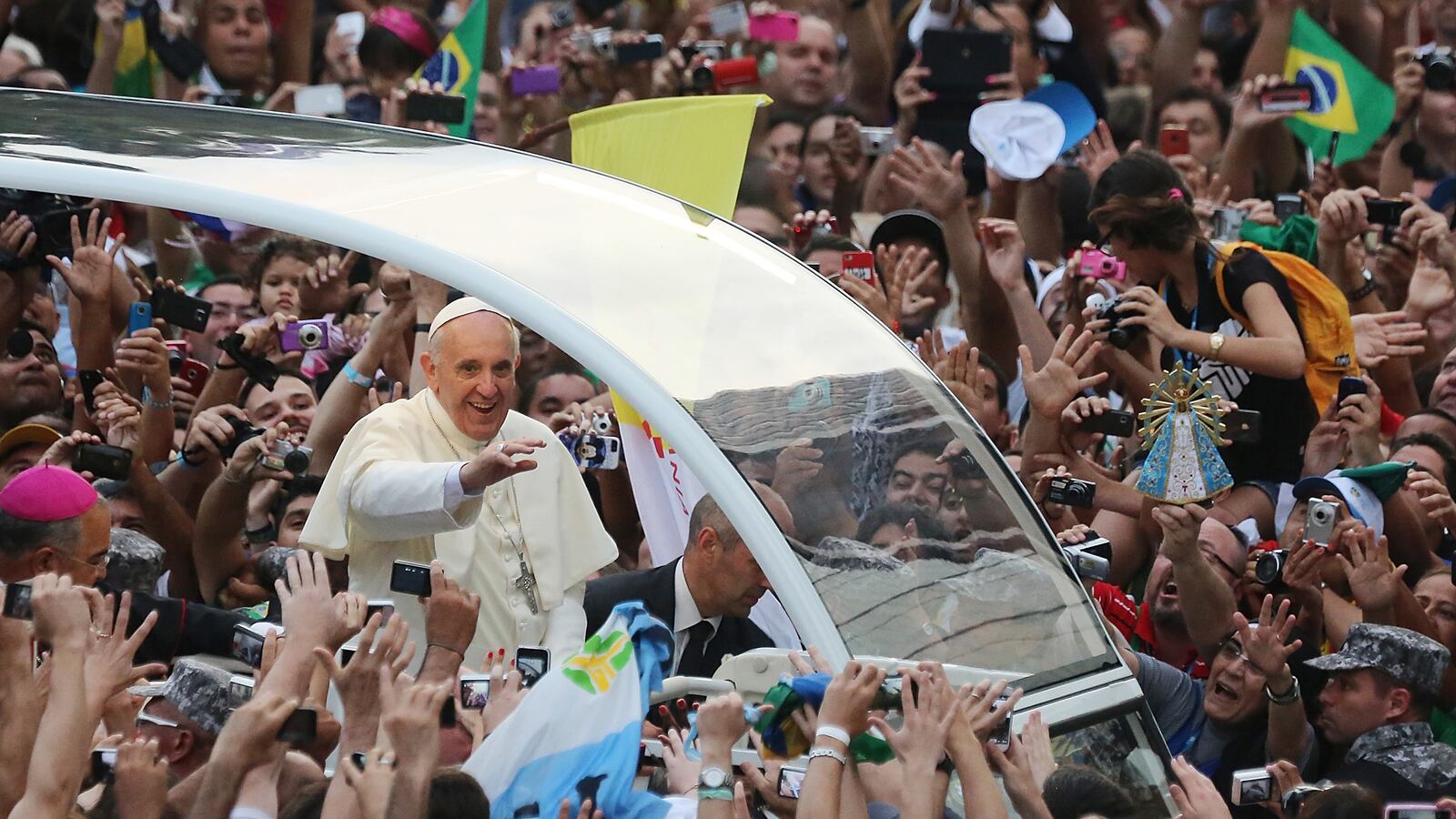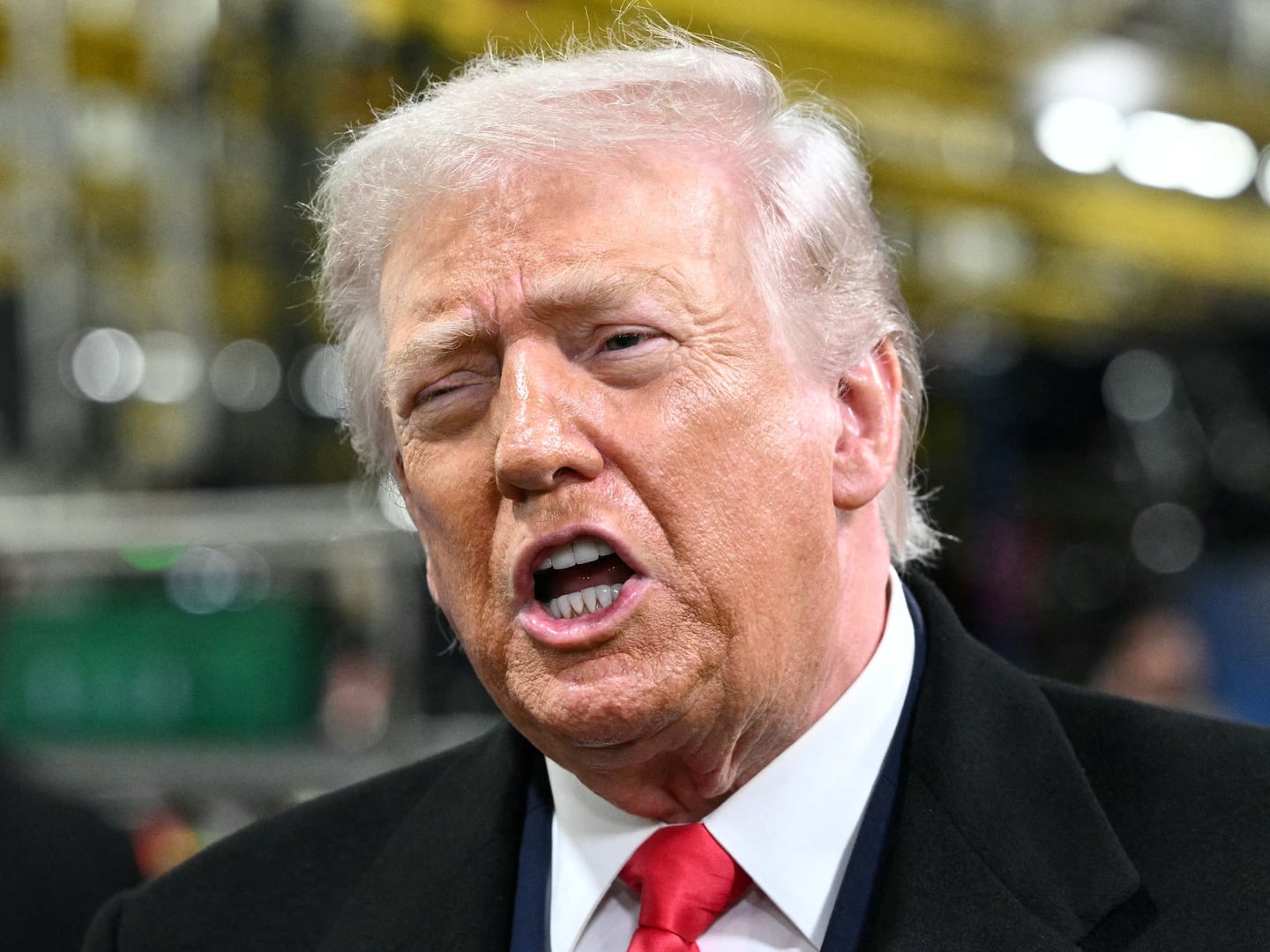Pope Francis's trip to Brazil this week has captured hearts and minds as well as stoked pride among officialdom in Rio de Janeiro. President Dilma Rousseff, Rio governor Sergio Cabral, and mayor Eduardo Paes have taken turns squiring the pontiff to ceremonies. "It's a joy to welcome the pope here," said Paes, who declared a two-day holiday in honor of the papal visit and yesterday handed the Holy Father the key to the city.

But not everyone has been enchanted. Just ask Mariana Wright. The 31-year-old Rio de Janeiro resident set out for airport yesterday with her two small children to take advantage of the long holiday weekend and flee the crush of pilgrims in her hometown. She spent most of the day battling a teeming airport, roadblocks, massive traffic jams, and intransigent municipal security before being forced to scrap her trip and return home seven hours later. "I am Catholic. I like the fact that the pope came here," says Wright. "But this is absurd. Rio is not prepared for an event like this."
Plenty of other Cariocas, as this city's natives are known, might say amen. Since touching down in Brazil Monday afternoon, Pope Francis's emotion-filled visit has tied this signature Latin American city in knots. Gridlock, public transportation snafus, power outages, and a week of rain have dogged this storied metropolis and strained the patience of even the most ardent of pilgrims and patriots. You might call it the holy visit from hell.
To be sure, no one is calling for the pontiff to go home. But in a city where the holy visit is just one in a series of headline international events to which Brazil will play host—including the 2014 World Cup and the 2016 Olympics—the mess in Rio is worrisome.
Minutes after leaving Rio's Antonio Carlos Jobim international airport Monday, the pope's motorcade took a bad turn and nearly came to a halt on a busy downtown thoroughfare jammed with cars and buses. Astonished at their good luck, hundreds of commuters swarmed the convoy hoping for a glimpse of the beloved Francisco, and maybe even a papal pat on the head. Francis took it in stride and, to the despair of his body guards, threw open the car window and waved to the adoring mob, as local and federal authorities blamed one another for the risky detour.
That was not the only screw up. On Wednesday, a power failure in the metro system halted trains for two hours just as hundreds of thousands of pilgrims were boarding for Copacabana beach for the official opening of World Youth Day. Many resorted to the city bus system which was quickly overwhelmed. "The Pope is a maker of traffic jams," joked mayor Paes.
Yet more bad news followed on Thursday when officials called off two open-air meetings and a Sunday mass in a field in Guaratiba, a fishing village in the Rio suburbs, where heavy rains had left the prayer grounds a sea of mud. Citing health risks, city and church authorities announced the weekend gatherings would be shifted to Copacabana, frustrating thousands of pilgrims who had pitched their tents in Guaratiba's Field of Faith, 30 miles from Copacabana.
Questioned about what went wrong in Guaratiba, Paes told reporters that the city had invested no public money in the prayer grounds, only in dredging surrounding rivers for drainage. "Let's not turn the [pope's] visit into a game of accounting, or of economic gains," Paes said. "We are welcoming a spiritual leader, a head of state. Rio benefits greatly from this and we are very happy to receive the pope."
Mariana Wright begs to differ. Her thwarted escape from Rio was the stuff of a bad telenovela. With throngs of pilgrims expected in town, her husband away, and a 2-year-old son and 5-year-old daughter at home, she had carefully planned her getaway, booking a trip to Curitiba, a regional capital in southern Brazil.
Leaving home at 8 a.m., the Rio psychologist took a cab to the downtown airport, in plenty of time for the 11 a.m. flight. With the airport covered by rain clouds, confusion reigned. Wright was told only that the flight had been delayed, while other passengers learned it had been canceled. With word that protestors were occupying the tarmac at the international airport across town, transfer to another flight at Rio's other terminal was out of the question. Instead of risking booking a flight for the following morning, a time when Curitiba is frequently socked in, she gave up and decided to head home. It took the airline another hour to find her bag.
By 1 p.m. she was in a cab heading home to Copacabana, or so she thought. With Catholics streaming to the beach to hear the pope, and roadblocks in place, traffic was backed up for several miles. Her cab driver balked and advised her to take the subway, but when she arrived at the metro station she hit another barrier.
For the pope's visit, the city had restricted metro traffic to passengers holding special timed tickets sold in advance. Since Wright had no plans to take part in the beachside homily and ticket booths were shuttered, she was out of luck.
Then things got worse. Turned away by one station watchman, she talked her way over to another security guard, dragging her two children and suitcase down the long stairway to the underground platform. But after consulting with his boss, the second guard also wagged his head. That's when she lost it.
"I sobbed," Wright says. "I just wanted to get home." Moved by her desperation, the station guard allowed her to board the train. The subway car was packed with pilgrims, but oddly not a Christian rose to offer her a seat. "I wedged my kids in as best I could between my suitcase and the row of seats. My 2-year-old lay down on the floor of the train and slept. Everyone thought it was so cute, but no one lifted a finger," she said. When the train stopped in Copacabana, finally one passenger and his pregnant wife rose to help. "The man carried my son, the woman held my daughter's hand and I carried the suitcase, and they walked us home."
By then, it was 3 p.m. "It's good that the pope has come to Brazil," says Wright. "But Jesus! This was agonizing. People should not be forced to participate in the celebration, especially with two small kids." If not for “four guardian angels,” she says, referring to the two security guards and the couple of strangers on the train, "I don't know what I would have done."
Pope Francis is scheduled to stay in Rio through Sunday, where he will cap World Youth Day with a mass on the sands of Copacabana. Some 1.5 million worshippers are expected to be on hand. But don't look for Mariana Wright.





